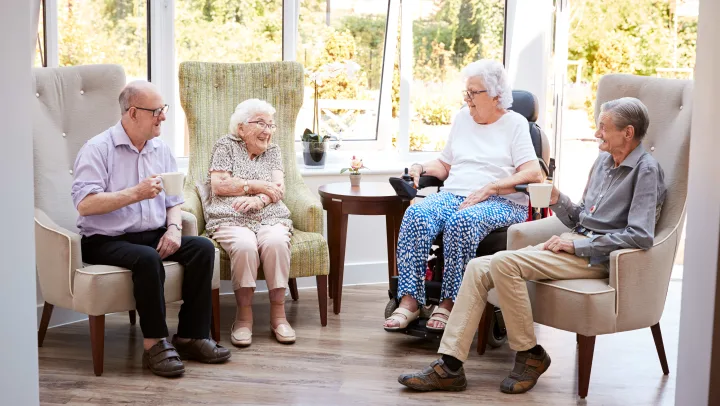Understanding Just How Helped Living Supports People With Mental Deterioration Treatment Needs
Aided living centers are increasingly recognized for their pivotal role in resolving the complicated care demands of patients with mental deterioration. By offering an organized yet nurturing atmosphere, these facilities not just promote security and wellness yet likewise promote a sense of freedom through individualized treatment plans.
Summary of Dementia Care
Dementia treatment is increasingly essential as the occurrence of dementia-related problems increases amongst aging populations. The condition can vary dramatically in its discussion, calling for customized care techniques to satisfy specific requirements.
Reliable mental deterioration treatment involves a multidisciplinary strategy, incorporating medical, mental, and social assistance. Health care specialists, caretakers, and relative need to team up to create a caring setting that promotes the well-being of individuals with dementia. Trick parts of dementia treatment include personalized care strategies, cognitive excitement therapies, and behavior interventions targeted at boosting top quality of life.
Additionally, it is important to identify the emotional and mental difficulties encountered by both patients and caretakers. Education and learning and training for caregivers play a critical function in fostering understanding and compassion, thereby improving communications with those impacted by mental deterioration. As the need for mental deterioration treatment remains to increase, the emphasis needs to remain on providing thoughtful, person-centered treatment that appreciates the dignity and preferences of people living with this problem.
(Dementia Care Charlotte)
Duty of Assisted Living Facilities
Helped living facilities play a vital function in providing take care of individuals with dementia, offering an encouraging setting that stabilizes freedom with the essential assistance. These facilities are designed to deal with the one-of-a-kind demands of residents, promoting a sense of area while ensuring safety and health.
In an assisted living setting, qualified personnel supply continuous assistance, aiding with daily tasks such as bathing, dressing, and drug management. This level of treatment is crucial for individuals with mental deterioration, that may fight with these jobs due to cognitive decrease. Additionally, centers often include memory-enhancing programs and social activities customized to boost cognitive functioning and encourage social communication.
The physical setting of assisted living centers is also maximized for safety and security, featuring safe and secure entrances, well-lit pathways, and clear signs to help locals navigate their environments. These communities cultivate a sense of belonging, minimizing the sensations of isolation that individuals with dementia might experience.
Personalized Care Program
To make sure that each resident gets the most ideal treatment, individualized care plans are important in nursing home for people with mental deterioration. These plans are tailored to fulfill the one-of-a-kind requirements, choices, and difficulties encountered by each resident, advertising their self-respect and lifestyle.
The advancement of an individualized care strategy generally begins with a thorough assessment performed by healthcare specialists. Memory Care. This assessment reviews the individual's cognitive capabilities, physical health and wellness, psychological health, and social preferences. Input from relative and the resident themselves is crucial, as it provides valuable understandings into their history, routines, and personal rate of interests
As soon as the assessment is complete, a multidisciplinary team collaborates to create a treatment strategy that lays out specific objectives and interventions. This may consist of medicine administration, daily living help, and behavior techniques tailored to mitigate anxiety or agitation.
Regular evaluations and updates to the care plan guarantee it continues to be relevant as the individual's condition evolves. Assisted Living. By prioritizing customized care, aided living centers can improve the general wellness of citizens with mental deterioration, cultivating a setting that appreciates their uniqueness while addressing their care needs efficiently
Engaging Tasks and Socializing
Involving activities and socializing play an essential duty in boosting the top quality of life for citizens with dementia in nursing home. These tasks are developed to boost cognitive feature, promote emotional wellness, and foster links amongst locals. Organized programs, such as art therapy, songs sessions, and memory treatment, supply chances for people to reveal themselves creatively while additionally activating positive memories.
Socialization is equally important, as it fights sensations of isolation and loneliness that can accompany dementia. Group tasks, including games, team outings, and common eating, urge communication and help citizens build helpful partnerships with peers and caretakers. This sense of neighborhood not just enriches their everyday experiences however also adds to a more steady psychological atmosphere.
Furthermore, engaging tasks can be tailored to private choices and cognitive levels, ensuring that each local can get involved meaningfully. By creating an atmosphere that prioritizes engagement and social interaction, helped living centers can considerably improve homeowners' overall mental wellness, cultivating a sense of objective and belonging. Ultimately, these efforts are crucial components of comprehensive mental deterioration treatment, dramatically impacting locals' overall wellness and joy.
Advantages of Neighborhood Support

Furthermore, area assistance advertises social interaction, which is vital for cognitive and psychological health and wellness. Engaging with peers and participating in group tasks can boost mood and urge reminiscence, contributing to a greater sense of advice belonging. This social interaction is important, as isolation and seclusion can exacerbate cognitive decrease.

(Charlotte Alzheimer's Care)
Verdict
To conclude, assisted living facilities offer as vital atmospheres for people with dementia, using organized support that promotes both freedom and safety and security. The implementation of customized treatment strategies guarantees that each citizen's one-of-a-kind needs are met, while involving activities promote social communication and cognitive involvement. The feeling of community within these facilities substantially minimizes sensations of seclusion, boosting overall emotional well-being. Thus, assisted living plays an essential function in boosting the high quality of life for people with dementia.